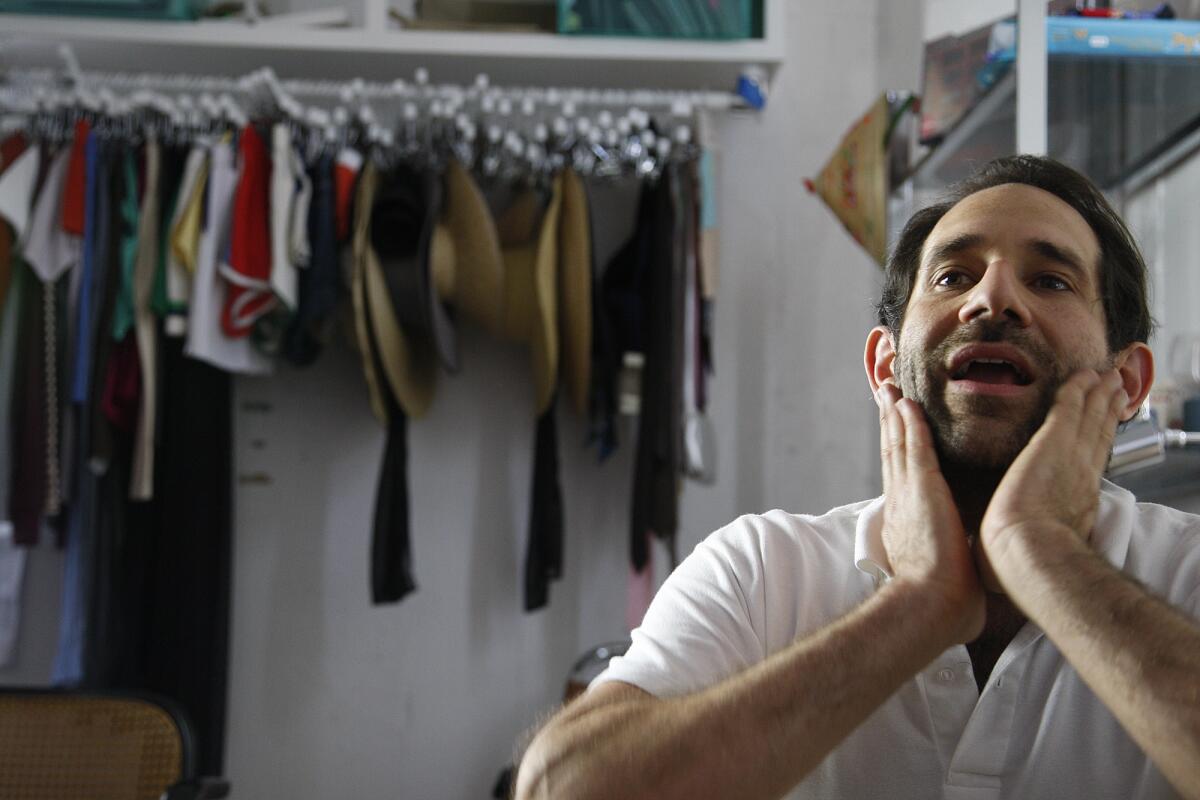American Apparel saga: Why did it take so long to sack Dov Charney?

- Share via
The American Apparel story is a saga of sleazy behavior and flagrant dereliction of duty. No, we’re not talking about the Los Angeles company’s founder, chairman and CEO, Dov Charney, though he’s bad enough.
We’re talking about its board of directors.
------------
FOR THE RECORD
An earlier version of this post referred to writer Claudine Ko’s first name as Charlene.
------------
For years leading up to its unceremonious firing of Charney this week, the company’s board looked the other way and made transparent excuses for his unprofessional and allegedly unlawful personal conduct. After this week’s sacking, the board’s newly-appointed co-chairman, Allan Mayer, defended its years of inaction by telling Times reporters: “A board can’t make decisions on the basis of rumors and stories in newspapers.”
Mayer is a PR man by trade (co-author, with Michael Sitrick, of “Spin: How to Turn the Power of the Press to Your Advantage”), so a proper default assumption is that he’s hiding something in those words.
But they’re preposterous on their face. Charney has been repeatedly accused of sexual improprieties by so many former employees and others in court papers and official proceedings that the board had ample cause to take them seriously long before now.
Read the company’s latest annual report, which states that in August 2010, the U.S. Equal Employment Opportunity Commission found in a case involving ex-employee Sylvia Hsu that “reasonable cause exists to believe we discriminated against Ms. Hsu and women, as a class, on the basis of their female gender, by subjecting them to sexual harassment.” The company settled the case with a payment to Hsu.
“Rumor”? “Story in newspapers”? No. Official proceeding.
Back in 2011, my colleague Andrea Chang reported on American Apparel’s response to a sexual harassment lawsuit filed by four female ex-employees against Charney and the company. “Preposterous,” the company said. At the company’s headquarters, Charney displayed for Times reporters “photos showing some of the women posing nude in suggestive positions, in one case with Charney,” Chang reported.
Get your mind around that for a moment. As a defense in a sexual harassment suit, Charney displayed a photo of himself posing with one of his own nude, “suggestive” employees. This was supposed to be his defense?
Yes, that was a newspaper story. But “rumor,” Mr. Mayer?
In 2008, an employee named Jeneleen Floyd filed a lawsuit alleging hostile sexual behavior by Charney in the workplace, including a demand that she “pretend to masturbate” in his presence. The company forced Floyd into arbitration and the lawsuit was dismissed. During an interview for a 2004 profile in the magazine Jane, Charney reportedly casually masturbated in front of the writer, Claudine Ko.
“Rumor”?
The most astonishing case of the board’s turning a blind eye to the dangerous reality of Dov Charney, chairman and CEO, involves a wrongful termination case brought in 2005 by former employee Mary Nelson. She alleged a raft of hostile sexual incidents in the workplace.
To make the case go away, the parties entered into a remarkable agreement. The company would pay Nelson $1.3 million, and stage a sham arbitration. The arbitrator would issue a pre-cooked “decision” finding Charney utterly blameless, after which American and Charney would issue a press release stating that “an arbitrator has ruled in their favor ... putting an end to the sexual harassment claims.” No mention of the payoff would be made. But no real arbitration would take place, either.
American later alleged that the deal was cooked up by Nelson’s attorneys. Is this plausible? The deal fell apart when one of her lawyers refused to attend the sham arbitration hearing. Subsequently it was exposed by a California appeals court, which called the proposed press release “materially misleading” and suggested that the whole arrangement harbored elements of “illegality, injustice and fraud.”
But the appellate justices didn’t follow this path to its obvious destination. American Apparel was prepared to issue a manifestly and materially misleading corporate statement to the public. It had worked to undermine the very process of arbitration. (In fact, the appeals court, which was ruling on a side issue, hinted strongly that it would have been loath “to enforce the ‘arbitration.’”)
This went beyond Charney’s behavior, and implicated the ethical standards of American Apparel and its board of directors. Two directors who were serving in 2008, when the appeals court outlined this egregious deal, remain in place today, including Mayer, the new co-chairman. Think about that the next time American Apparel asks you to believe a press release it issues -- on any topic.
Some of the reasons the American board has waited so long to move against Charney are obvious. He can be a talented and farsighted executive, even when his hand is on his zipper. American has had ups and downs, and Charney has been in charge for both sides of the cycles -- he’s run the company into trouble, but sometimes gotten it out of trouble too.
According to American’s April proxy statement, Charney is the largest shareholder by far, with 27% of its shares; in the past he’s been protected by an anti-dilution provision from losing his dominant shareholding position. He has also pledged some of his personal wealth to cover its debts.
But American Apparel has been a model of a company desperately in need of adult supervision. As long as Charney has served as both CEO and chairman, it hasn’t had any. For years it has been under the control of a chief executive who didn’t recognize that it’s one thing for a company to have a “hip” and “edgy” commercial image, and quite another for the boss to behave like a character in a Martin Scorsese movie.
The company addressed this issue in its proxy statement, asserting that Mayer’s role as “lead independent director” produced “a balance of power between the Chief Executive Officer and the independent directors,” allowing the latter to “provide objective and thoughtful oversight of management.”
Plainly, that hasn’t been true. If the directors really were thoughtfully overseeing management, things never would have gotten to the point where their only option was to fire their founder, out of the blue. That’s a move that may lead to American Apparel’s bankruptcy because of the terms of some of its loans, the company disclosed Thursday.
Given Charney’s record, the American board’s oversight has been anything but thoughtful. The directors have no one to blame for this fiasco but themselves.
Keep up to date with The Economy Hub by following @hiltzikm.
More to Read
Inside the business of entertainment
The Wide Shot brings you news, analysis and insights on everything from streaming wars to production — and what it all means for the future.
You may occasionally receive promotional content from the Los Angeles Times.











